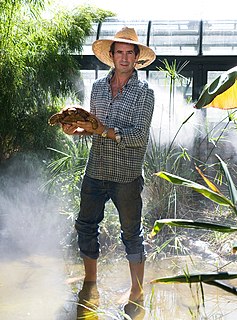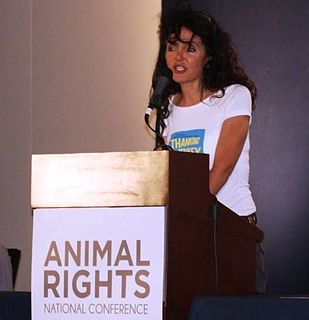A Quote by Gary L. Francione
I find it very annoying that so many animal advocates talk about the difficulty of being vegan. Many animal advocates are inclined to make the issue their suffering and not the animals' suffering, and I suppose that accounts for part of the reason that veganism is portrayed as such a "sacrifice." And many animal advocates are not vegans, or are "flexible vegans," which means that they do not observe veganism at all or not consistently, and emphasizing the supposed difficulty of veganism is part of justifying their own behavior.
Related Quotes
Undercover investigations threw back the curtain on the systemic exploitation of animals on factory farms. The response by agribusiness interests has been to back laws that ban animal advocates from taking pictures or videos at these facilities, and ban the media from publishing any that are taken. The laws also make it a crime for animal advocates to seek employment at animal enterprises without disclosing their intentions.
The most important form of incremental change is the decision by the individual to become vegan. Veganism, or the eschewing of all animal products, is more than a matter of diet or lifestyle; it is a political and moral statement in which the individual accepts the principle of abolition in her own life. Veganism is the one truly abolitionist goal that we can all achieve - and we can achieve it immediately, starting with our next meal.
The response by agribusiness interests has been to back laws that ban animal advocates from taking pictures or videos at these facilities, and ban the media from publishing any that are taken. The laws also make it a crime for animal advocates to seek employment at animal enterprises without disclosing their intentions. Media coverage of the legislative fights is overwhelmingly negative for agriculture interests. The impression left among consumers is that the proponents had something to hide.
When it comes to animal agriculture, there is conventional, which is rally hideous, and 'compassionate' and 'certified humane' or whatever, which 'may' be 'slightly' less hideous. But it is all torture. It's all wrong. These 'happy' gimmicks are just designed to make the public feel better about exploiting animals. Don't buy the propaganda of 'happy' exploitation. Go vegan and promote veganism.
Many people will first be attracted to veganism for their health but find themselves far more open to learning about the animal issues when they don't have to block them out three times a day in order to enjoy eating. Then once people learn, it is hard to forget and go back. Come for the body, stay for the soul.






























